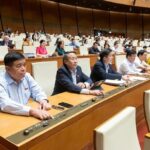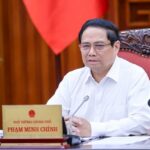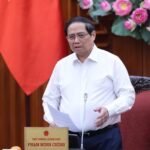The Ministry of Home Affairs is seeking feedback on the draft Law on Official Staff (amended), expected to be submitted to the National Assembly for consideration at the 10th Session (in October).
According to the drafting agency, the Law on Official Staff (amended) is being developed to realize the Politburo’s guidelines on developing public non-business units and address any difficulties and bottlenecks in the implementation process.

The Ministry of Home Affairs proposes to amend the Law on Official Staff at the 10th Session of the 15th National Assembly.
One notable aspect of the draft Law is the innovation in the recruitment, employment, and management of official staff, as well as the rights and obligations of official staff in public non-business units.
Specifically, the draft Law focuses on perfecting the human resource management mechanism by putting laborers at the center, creating flexibility in the use of public and private human resources, and establishing a mechanism to attract high-quality human resources. It also aims to reduce administrative procedures and overcome limitations and shortcomings in current laws while meeting the demands of national governance reform and building a professional, responsible, dynamic, and people-serving official staff team.
The Ministry of Home Affairs aims to expand the rights of official staff. Accordingly, official staff can sign work contracts with other agencies, organizations, or units that are not prohibited by law, provided they complete assigned tasks and obtain the consent of the head of the public non-business unit.
Official staff are allowed to contribute capital, participate in the establishment, management, and operation, or work in enterprises established by the non-business unit they are working for, or co-founded by that unit, to commercialize research results and efficiently exploit intellectual property, inventions, and digital technologies created by the organization.
”
Official staff can be seconded to work at scientific and technological organizations, universities, businesses, and other organizations for a certain period. They are allowed to contribute capital, establish, manage, or participate in technology development in domestic and foreign enterprises in accordance with the law.
“, the draft Law states.
The drafting agency notes that in the case of official staff who are heads of units, the consent of the direct managing authority is required. During their time working in these organizations, official staff will retain their salary and other policies and will be considered for planning, appointment, training, and fostering in accordance with regulations.
Salary Based on Position and Output Results
Another noteworthy proposal by the Ministry of Home Affairs is to continue promoting the management of official staff and salary payments based on position and output results.
Accordingly, it is clear that the recruitment, management, evaluation, arrangement, and employment of official staff must be based on the requirements of the position and the capacity, results, and efficiency of the official staff in performing their tasks, moving towards abolishing the regulation on salary ranking associated with the consideration of promotion in the professional rank of official staff.
At the same time, there are expanded provisions on contract signing and acceptance to facilitate the transition between the private and public sectors and vice versa, according to job requirements and actual capacity in an environment of “competition,” openness, transparency, and equality.
In parallel, innovations in the recruitment of official staff aim to build a team management mechanism by clearly distinguishing between areas providing essential and non-essential public services.
The amended Law on Official Staff diversifies recruitment methods by adding direct contracting for experts, scientists, and talented individuals suitable for the field of activity of the public non-business unit, in addition to the traditional methods of competitive examination and selection.
According to the Ministry of Home Affairs, this diversification of recruitment methods will facilitate the proactive recruitment of official staff by public non-business units, moving towards a professional and modern management model.
The amended Law on Official Staff stipulates recruitment methods for units providing essential public services and those not providing essential public services, with the latter moving towards contract-based recruitment.
Additionally, the amended Law specifies the conditions for registration and participation in the recruitment process for individuals with Vietnamese nationality living abroad or foreign nationals living in Vietnam, in accordance with the decisions of the competent authority.
The Law also gives priority to the recruitment of talented individuals, individuals with achievements and contributions to the nation, and ethnic minorities. It promotes the application of science and technology in the recruitment process and integrates data on official staff management in each sector and field.
There is a change in the internship regime (successful candidates for official staff positions must undergo an internship, except in cases where they have at least 12 months of professional experience suitable for the job requirements).
The Alluring Art of Compensation
The Ministry of Home Affairs proposes amendments to the law, suggesting a gradual shift away from the current system of rank-based classifications for civil servants. The proposed changes aim to refine the management, utilization, and salary structure by adopting a position-based approach.
The New Threshold for Procurement Contracts: Raising the Bar to 300 Million
On November 29, with an overwhelming majority of 444 out of 446 National Assembly delegates voting in favor (accounting for 92.69% of the total number of National Assembly deputies), the National Assembly passed the Law amending and supplementing a number of articles of the Law on Planning, Investment Law, Law on Investment in the form of Public-Private Partnership, and the Bidding Law.
“The Perils of Being a Perpetual Money Lender”
“I find it hard to believe that we are handing over money for others to spend,” exclaimed National Assembly Deputy Le Quan, referring to cases related to corporate bonds. Emphasizing the need for proper regulations, he pointed out that the Vietnamese bond market has not been developing as per market rules. To mitigate risks for investors, he proposed holding auditing firms accountable.
The Power of Persuasion: Unlocking Resources for Development
On the afternoon of September 11, Prime Minister Pham Minh Chinh chaired a meeting of the Government’s Standing Committee on a range of key issues. Deputy Prime Minister Ho Duc Phoc and leaders from various ministries and central agencies also attended the important discussion.
Unlocking Immediate Solutions: Proposing Amendments to Seven Laws
The proposal by the Ministry of Finance to develop a law to amend and supplement seven existing laws has been approved by the Prime Minister. Emphasizing the urgency of addressing pressing issues, the Prime Minister has directed a thorough review to ensure the law’s effectiveness in facilitating business operations and promoting economic growth.














































